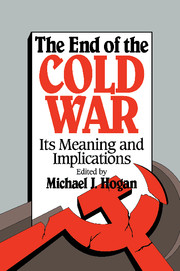Book contents
- Frontmatter
- Contents
- Preface
- The Authors
- Dedication
- 1 Introduction
- 2 An End to Which Cold War?
- 3 The Cold War, the Long Peace, and the Future
- 4 Quiet Cataclysm: Some Afterthoughts on World War III
- 5 Some Lessons from the Cold War
- 6 Nuclear Weapons and European Security during the Cold War
- 7 Victory in the Postwar Era: Despite the Cold War or Because of It?
- 8 The Wicked Witch of the West is Dead. Long Live the Wicked Witch of the East
- 9 The End and the Begining
- 10 A Balance Sheet: Lippmann, Kennan, and the Cold War
- 11 Why Did the Cold War Arise, and Why Did It End?
- 12 A View from Below
- 13 The End of the Cold War and the Middle East
- 14 The End of the Cold War in the Near East: What It Means for Historians and Policy Planners
- 15 After the Cold War: The United States, Germany, and European Security
- 16 The End of the Cold War: A Skeptical View
- 17 The End of the Cold War, the New Role for Europe, and the Decline of the United States
- 18 The Fading of the Cold War—and the Demystification of Twentieth-Century Issues
- 19 The U.S. Government, a Legacy of the Cold War
- 20 Foreign Policy, Partisan Politics, and the End of the Cold War
- 21 Beyond Bipolarity in Space and Time
- 22 A Usable Past for the Future
- Selective Bibliography
- Index
22 - A Usable Past for the Future
Published online by Cambridge University Press: 18 December 2009
- Frontmatter
- Contents
- Preface
- The Authors
- Dedication
- 1 Introduction
- 2 An End to Which Cold War?
- 3 The Cold War, the Long Peace, and the Future
- 4 Quiet Cataclysm: Some Afterthoughts on World War III
- 5 Some Lessons from the Cold War
- 6 Nuclear Weapons and European Security during the Cold War
- 7 Victory in the Postwar Era: Despite the Cold War or Because of It?
- 8 The Wicked Witch of the West is Dead. Long Live the Wicked Witch of the East
- 9 The End and the Begining
- 10 A Balance Sheet: Lippmann, Kennan, and the Cold War
- 11 Why Did the Cold War Arise, and Why Did It End?
- 12 A View from Below
- 13 The End of the Cold War and the Middle East
- 14 The End of the Cold War in the Near East: What It Means for Historians and Policy Planners
- 15 After the Cold War: The United States, Germany, and European Security
- 16 The End of the Cold War: A Skeptical View
- 17 The End of the Cold War, the New Role for Europe, and the Decline of the United States
- 18 The Fading of the Cold War—and the Demystification of Twentieth-Century Issues
- 19 The U.S. Government, a Legacy of the Cold War
- 20 Foreign Policy, Partisan Politics, and the End of the Cold War
- 21 Beyond Bipolarity in Space and Time
- 22 A Usable Past for the Future
- Selective Bibliography
- Index
Summary
To those living through it, each era seems unique. But I suspect that even later generations will share this perception of the 1990s. Rarely if ever has world politics been fundamentally reordered without a major war. Of course, in some sense we have witnessed a major war, and the Soviet Union lost it. But the differences between a conflict that was prolonged yet bloodless—at least for the major protagonists—and a “normal” war are very great. This is even true for the victor. While the Soviet Union confronted the internal turmoil and revolution that often accompanies a military defeat, the United States, even with its triumph in the Gulf war, does not appear to have the strength, will, or vision to establish a “new world order.” The structure of power in the post-Cold War world also appears to be unique. Indeed, we cannot even characterize it in terms of the system's polarity, the concept of which political scientists are so enamored. Is the system unipolar because the United States is so dominant, bipolar because nuclear weapons are still concentrated in two hands, tripolar because we can anticipate the emergence of a united Europe that will take its place alongside the two former superpowers, or multipolar because so many forms of power-especially economic power-are now widely dispersed? The coming era also seems odd because it is hard to locate a main axis of conflict. In the past, the two leading states usually were adversaries because each constituted a potential if not actual menace to the other.
- Type
- Chapter
- Information
- The End of the Cold WarIts Meaning and Implications, pp. 257 - 268Publisher: Cambridge University PressPrint publication year: 1992



